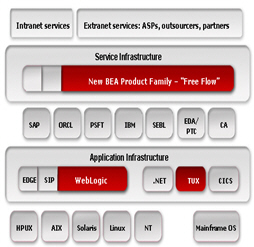BEA to play the independent platform provider card

Marge Breya left Sun after ten years—most recently as senior vice president of marketing for the Global Sales Operations--to join BEA, where she is chief marketing officer. Both companies are regularly viewed by analysts and armchair quarterbacks (including myself) as navigating rough seas. Sun has a compelling set of products, a forward-thinking strategy and lots of cash, but the watchers are still looking for the silver lining in the business plan. BEA, like Sun, has been a revolving door for executives, and faces challenges in its core application infrastructure product line from IBM as well as the growing open source world.
Breya is leading the go-to-market strategy for BEA’s move up the enterprise software stack, above the Java layer, with (code name) Project Free Flow, which is set for official debut on June 9. It's basically a service infrastructure grid that allows composite applications and services to be composed that are abstracted from the underlying systems and technology. Whereas BEA’s J2EE-based WebLogic is about developing code and compiling, FreeFlow is an SOA environment for modeling business processes and building composite applications without reliance on programmer skills.
BEA Stack View

BEA is not alone is developing an SOA service infrastructure that allows non-technical business people to compose business processes and modify workflows. Every other major enterprise software vendor and many start-ups are moving in similar directions. BEA is playing the independent platform provider card as a differentiator:
"The industry's interests cannot be served by the digital imperialism of application or database vendors seeking to perpetuate their agenda. An independent, bias-free provider delivers more choices, is better able to drive and adopt open standards, and collaborates more freely with the entire partner community to deliver a broader range of customer-focused solutions. It's freer to drive technology in the direction of maximum transparency, flexibility, and cooperation....BEA's independent infrastructure allows customers to maintain ownership of the intellectual property and labor they’ve invested in custom business logic—without threat of vendor lock-in. If you compose it, compile it or code it, you own it. These ownership rights also provide more freedom in choosing systems and providers, protecting the CIO’s leverage with vendors."--BEA's Web site
The lure of the independent platform vendor is less of a deal maker than in the past. Enterprises are looking for integrated solutions with a rapid ROI, not necessarily agnosticism, especially at a time when standards-based computing based on Web services and XML is becoming the norm. But, it's a big market and opportunity to provide development tools for mere mortals. Instead of waiting for the programmers to get rid of a bottleneck in a business process, a non-techie manager could alter a workflow with a few clicks in a visual console. We'll have to wait until next month to find out if BEA has more to claim than platform agnosticism...